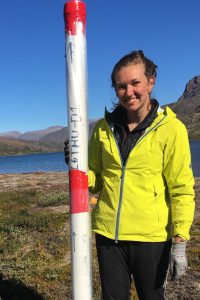Hydroclimate of Southern Greenland during interglacials of the past 600,000 years based on terrestrial leaf wax biomarker isotopes preserved in ocean sediments
Abstract
The Greenland Ice Sheet has the potential to contribute significantly to sea level rise in response to anthropogenic warming in the coming centuries. However, the long-term stability of the Greenland ice Sheet in response to warm climate conditions is poorly understood, in part due to a lack of records of terrestrial Arctic climate conditions during previous interglacials. I propose to analyze hydrogen isotopesof terrestrial vegetation biomarkers preserved in marine sediments during interglacials of the past 600,000 years (Marine Isotope Stages (MIS) 1, 5e, 7, 9, 11, and 13), to test the hypothesis that the greatest enrichment of precipitation isotopes, and thus greatest warmth, occurred during the last interglacial, MIS 5e.
Biography
As an undergraduate geology-chemistry student in the Brown University geosciences department, I became fascinated by the application of the analytical approach of chemistry to decode signals of change in Earth’s history. I was especially drawn to study biogeochemical proxies and their inherently interdisciplinary nature, as they are produced by ecology, studied on chemical scale, and record climate processes. I am currently pursuing a Ph.D. at the University at Buffalo, where my research has focused on understanding past hydroclimate change in western Greenland through the Holocene based on the analysis of organic geochemical proxies in lacustrine sediments. With the Schlanger fellowship, I will analyze the hydrogen isotopes of terrestrial biomarkers in ocean sediments to compare climate variability on much longer timescales, between Late Quaternary interglacials.







